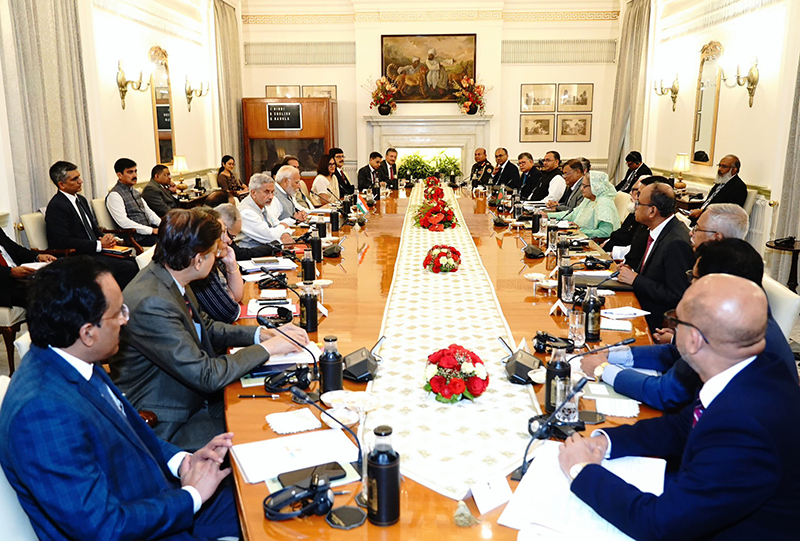


Indian Prime Minister Narendra Modi announced plans to open a consulate in Ranpur and initiate e-medical visa facility for Bangladeshi citizens, during bilateral talks with his counterpart Sheikh Hasina. This will be Sheikh Hasina's first State Visit to India since Narendra Modi came to power for a third straight term. The two leaders also discussed cooperation in various fields, with Modi highlighting Bangladesh as India's biggest development partner. This move is expected to further strengthen the bilateral ties between the two countries.
Indian Prime Minister Narendra Modi's Bilateral Talks with Bangladeshi Counterpart Deepen Ties
During a recent bilateral meeting, Indian Prime Minister Narendra Modi and his Bangladeshi counterpart Sheikh Hasina announced significant initiatives aimed at bolstering relations between the two nations.
Consulate in Ranpur and E-Medical Visa Facility
PM Modi unveiled plans to establish a consulate in Ranpur, a strategically located city in southern Bangladesh. This move is expected to enhance commercial, cultural, and people-to-people exchanges.
Additionally, India will introduce an e-medical visa facility for Bangladeshi citizens. This initiative simplifies the process for Bangladeshis seeking medical treatment in India, a destination known for its advanced healthcare infrastructure.
Bilateral Cooperation
The leaders also explored avenues for collaboration in various sectors, including trade, investment, energy, and water management. PM Modi emphasized Bangladesh's status as India's largest development partner.
Background
India and Bangladesh share a long and dynamic history. The opening of a consulate in Ranpur marks a new chapter in their diplomatic relations. The e-medical visa facility aligns with India's "Neighborhood First" policy, which prioritizes cooperative engagements with neighboring countries.
Top 5 FAQs and Answers
1. Why is India opening a consulate in Ranpur?
To strengthen diplomatic ties, promote trade, and facilitate people-to-people exchanges.
2. What is the significance of the e-medical visa facility?
It simplifies the visa application process for Bangladeshis seeking medical treatment in India.
3. What other areas of cooperation were discussed?
Trade, investment, energy, water management, and security.
4. What is Bangladesh's role in India's foreign policy?
Bangladesh is India's largest development partner and a key strategic ally in the region.
5. What are the expected outcomes of these initiatives?
Improved bilateral relations, increased investment, and enhanced connectivity between India and Bangladesh.
The initiatives announced by PM Modi and Sheikh Hasina reflect the growing partnership between India and Bangladesh. These measures are designed to foster collaboration, mutual respect, and a shared future between the two nations.

US President Donald Trump has expressed concern over the tone of incoming New York City Mayor-elect Zohran Mamdani's victory speech, calling it "angry" and advising him to adopt a more cooperative approach. In response, Mamdani has urged Trump to "turn the volume up" and vowed to hold "bad landlords" accountable, citing Trump as an example. Trump has hinted at offering limited federal help to New York under Mamdani's leadership, but has also expressed doubt towards the mayor-elect's left-leaning policies. This clash between the two leaders marks a tense beginning to their relationship.

Chief Election Commissioner Gyanesh Kumar flagged off 14 participants from 7 countries as part of the International Election Visitors’ Programme 2025 to witness voting in the Phase-I of the Bihar Assembly Elections. The participants attended an inaugural session and were provided with a demonstration of the EVMs and a presentation on various aspects of elections in India. The participants will then embark on a two-day tour of Bihar to visit EVM dispatch centers and witness the actual polling on November 6. Since 2014, the IEVP has been showcasing the strengths of India's electoral system and sharing best practices with international election management bodies. The first phase of the Bihar Assembly elections, featuring 121 constituencies and over 3 crore voters, will be held on November 6.

The recent police raid in Brazil, which resulted in one of the deadliest operations in Rio's history, has sparked outrage and protests. Families of the victims claimed that their loved ones were executed by the police, while the government celebrates it as a win against crime. Shocking images of bodies lined up in the street have led to widespread protests and accusations of police brutality. However, official reports and videos of victims' bodies suggest that the deaths were not a result of armed conflict, raising questions about the excessive use of force by the police.

Four people have died and 11 have been injured after a UPS cargo plane crashed near Louisville Muhammad Ali International Airport in Kentucky. All flights in and out of the airport have been suspended as police and emergency services are attending the scene. Kentucky governor Andy Beshear has described the accident as "catastrophic" and is urging residents to obey any shelter-in-place orders.

Eight people have been killed and numerous others injured after a passenger train collided with a goods train in Chhattisgarh. The accident occurred in the afternoon, halting train services on the route and prompting the cancellation or diversion of multiple trains. Emergency teams have been dispatched to the scene, with rescue operations ongoing and medical treatment being provided to the injured passengers. Helpline numbers have been issued for convenience, and the railway authorities have assured that all efforts are being made to assist those affected by the tragedy.

Today, 5 November 2025, marks the 556th birth anniversary of Guru Nanak Dev Ji, the founder of Sikhism. As we celebrate this sacred and highly revered festival, let us remember and spread the teachings of Guru Nanak Dev Ji, which promote compassion, humility, and love for all. To commemorate this occasion, indianexpress.com has compiled heartfelt wishes and messages to share with friends and family, wishing everyone endless happiness, peace, and prosperity.

During the Emerging Science Technology and Innovation Conclave, PM Modi announced the launch of the Rs 1 lakh crore Research, Development and Innovation Fund. This fund, under the Department of Science and Technology, aims to encourage private sector investments in R&D to drive India's vision of becoming an innovation-driven nation. With this fund, India's R&D expenditure has doubled in the last decade and the country now has the world's third-largest startup ecosystem. PM Modi also highlighted how India's domestic capability has accelerated during the COVID-19 pandemic due to its successful digital public infrastructure.

A stampede at the Kasibugga Venkateswara Swamy Temple in Andhra Pradesh has left 10 dead and two injured. The temple had recently reopened and was experiencing high footfall due to a festival. Home Minister Vangalapudi Anitha has ordered a thorough investigation into the causes of the tragedy and has promised strict measures to prevent similar incidents in the future.

India and the United States have strengthened their already strong ties by signing a 10-year framework for their major defense partnership. The agreement, signed during a bilateral meeting between the two countries' defense ministers, emphasizes the importance of this partnership in maintaining a free and open Indo-Pacific region. This marks a significant step in solidifying the bond between India and the US in the defense sector.

In preparation for a major tri-service military drill, India has issued Notices to Airmen (NOTAM) for the entire northeastern region that borders China, Bhutan, Myanmar, and Bangladesh. The first set of exercises will commence in November and continue through January, signaling enhanced operational readiness for the Indian Air Force (IAF). This move is significant as the Northeast remains a sensitive theater, making up the boundary with four countries, including China. The upcoming IAF exercises aim to strengthen India's air dominance, effectively preparing for any potential challenges along the western frontier with Pakistan.